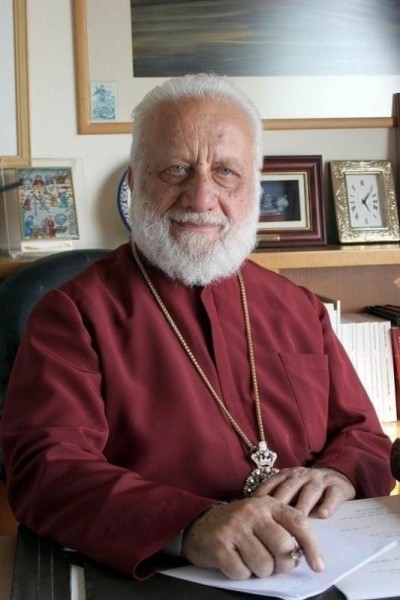Met Georges Khodr: The Question of Life
 This is the question of life: who is my neighbor? People think that the neighbor is a spouse, a child or an uncle, all those we call “relatives,” and people distinguish between neighbors and strangers. A neighbor is someone with whom we share our tastes, our religion, or kinship and a stranger is someone with whom we differ and whom we find foreign.
This is the question of life: who is my neighbor? People think that the neighbor is a spouse, a child or an uncle, all those we call “relatives,” and people distinguish between neighbors and strangers. A neighbor is someone with whom we share our tastes, our religion, or kinship and a stranger is someone with whom we differ and whom we find foreign.
Here the teacher of the law comes to Jesus, a theologian in Israel who had to have known the answer to the question before asking, and so the Bible says that he came to test Jesus and asked him, “How may I be saved?” Jesus replies, “Love the Lord your God with all your heart, with all your soul, with all your strength and love your neighbor as yourself.” The man knew that the Law of Moses commands love, but it distinguishes neighbor from foreigner. The Law says, “Only love the Jew.” Non-Jews are called “gentiles” and Jews had nothing to do with them.
Although the Samaritans lived near the Jews in the land of Samaria, they were regarded as foreigners because they believed only in the five books of Moses and did not accept the Jews’ prophets and because their blood had been mixed in marriage with foreign blood. Therefore the Jews regarded them as foreigners, had nothing to do with them and did not care for them.
When the teacher of the law asked Him, “Who is my neighbor?,” Jesus told him the parable that appears in today’s Gospel reading. Jesus did not answer the lawyer’s question directly, but rather responded to the question with a question: who do you reckon became a neighbor to that wounded man? He said, “The one who worked mercy for him.” This Samaritan, the hated, damned foreigner, became a neighbor to the injured Jew through love. The barriers between nations dissolved when Jesus came teaching mercy. The barrier between neighbor and stranger dissolved, between one neighborhood and another, between one region and another, between one village and another, between an old family and newcomers.
All of these worldly, self-interested concerns were destroyed by Christ. He said to us, “Before you is a specific person who needs you”: the poor or injured or lonely, or the one who feels that no one loves him. God has designated this person as your neighbor, if you go out to him. Thus the question “who is my neighbor?” is irrelevant. Go out to the person who you see in need of you, the one whom circumstances have placed along your path of life, no matter what his nationality, his religion, or… If you go out to him and love him, you make him your neighbor.
The fathers of the Church say that the Good Samaritan is an image of Christ because he is the one one who breaks the barriers between people and goes to all people. He sent his apostles into the entire world to create love between all people. Those who love each other are the ones who became the Church of Christ in love. It is naturally supposed that those who are baptized will love each other, to be a model for people, so that the light that is in them will shine forth and go out to others by way of love. In this way the true Church spreads, the Church of those who love.
The remedy is love. This means that after we encounter each other, we care, we serve, we sacrifice, and in this way the other person gets better because we have loved him.
Source: OrthoChristian.com






